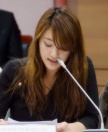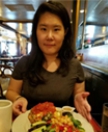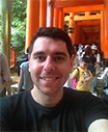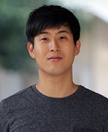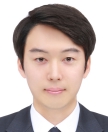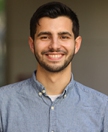Graduate Students
Shannon Bae
Shannon Doona Bae just recently returned to the U.S. after spending the past ten years in Seoul, South Korea, where she worked in solidarity with adoptee, unwed mother, and birth family groups, studied Korean at Sogang University, and completed her M.A. in Sociocultural Anthropology at Hanyang University, as a recipient of the Korean Government Scholarship Program. She has presented her research at conferences such as ASAK, TISKAS, and CUHK's APGSF, and has been invited as a guest lecturer at workshops for a variety of organizations, such as the Korean Ministry of Health and Welfare, Seoul International Women's Film Festival's Migrant Women's Film Academy, The People's House Human Rights Human Library, and the Diasporic Korean Youth Forum, among others. She is honored to have received the Center for Critical Korean Studies Fellowship in order to begin her Ph.D. in Sociocultural Anthropology at UC Irvine this fall.
Vanessa Catherine Baker
My dissertation, entitled Entangled Ecologies of the Everyday, traces the corporeal and ecological effects of primitive accumulation on the rural regions of the Japanese Empire as represented in Korean and Japanese literature of the 1920s and 1930s. I argue that rural proletarian literature employs a mode of ecological materialism and reveals the sustainability/unsustainability of laborers relations with the land under colonial-capitalism. I situate the interrelations of labor, gender, and nature, what I refer to as ecological entanglements, at the center of my textual analysis. Each chapter examines how these interrelations coevolve in the sectors of sericulture, forestry, mining, and fisheries.
Monica Wonju Cho
Monica's dissertation project focuses on the topic of madness in post-Korean War to contemporary literature. Her research centers on madness not only as a literary trope for a reflection on and solution for larger socio-political concerns, but also as a way of questioning the possibility of existence outside the existing system. In particular, Monica emphasizes the critical inquiry on the framework of madness from philosophical, psychiatric, and social traditions.
Zach Gottesman
Zachary Gottesman received his B.A. degree in International Studies from American University, his M.A. in Korean Studies from Korean University and is currently a PhD student in East Asian Studies at the University of California, Irvine where he is the recipient of the Center for Critical Korean Studies graduate fellowship. He researches contemporary Korean popular culture, including cinema, animation, art, music, games, and internet communities. He has published in the Journal of Japanese and Korean Cinema and has presented research at the Association for Asian Studies conference, the World Congress of Korean Studies, the Next Generation of Korean Studies Conference, and the Mechademia Conference on Asian Popular Cultures among others. He is currently working on a project on Korean hyperrealism in sculpture as well as a history of rotoscoping in animation.
Kristina Horn
My research examines the development of South Korean television broadcast since the Korean War. Broadly, my research examines an overall cultural history of South Korean television and the influences the American military had on South Korean television in the post-War period. In considering this, I examine how the medium of television embodies tensions between the global and the local, and the colonized and the colonizer. I take into consideration specific examples of the transnational movement of television licensing rights between South Korea and countries throughout the world. I examine how specific television shows act not only as corporate allegories for specific Korean broadcasting companies, but also instances of critical mimesis and soft power.
Soojin Jeong
Hea Sue Kim
My dissertation research examines the unique knowledge economy of South Korea in which there is a coexistence of science & technology with indigenous knowledge forms. I examine shamanism and space science in South Korea not as opposed but complementary knowledge practices being engaged in everyday spaces. My research will provide a broader understanding of what counts and what is at stake in the production of shared cosmos & futures in Korea.
Chungjae Lee
Chungjae Lee received his B.A. degree in Political Science from Waseda University and his M.A. in Social Sciences from the University of Chicago. He has been the recipient of many awards and fellowships, such as JASSO Honors Scholarship (Tokyo, Japan). His research focuses on popular sovereignty, constitutionalism, and nationalism. His dissertation project examines the discourse of democratic transformation in early 20th century Imperial Japan and colonial Korea with emphasis on the political thought of Minobe Tatsukichi (1873-1948) and of Cho Soang (1887-1958).
Wondong Lee
Wondong Lee is a Ph.D. student in political science at the University of California, Irvine. He studies the transnational epistemic communities of religious organizations in South Korea and the U.S., and their interaction with persons of different ethnicities, sexual orientations, and religious identities. North Korean (NK) communists and non-heterosexuals, along with Muslims, are considered the most disliked outgroups among Korean evangelicals. The North Korean regime and its supporters have long been considered the greatest enemy, but recently, many evangelicals claim that a global LGBT movement poses an existential threat to the liberties of Christians worldwide, including in South Korea. Lee's current project examines how Korean evangelicals emulate the general language of threat and outreach from their American counterparts and to what extent this contributes to making an alternative knowledge sphere/regime vis-à-vis the “scholarly” knowledge on sexuality. A global network of threat-oriented, Christian rights organizations and media disseminate stories of outgroups (e.g., North Korean regime, LGBT movement) threatening the lives and/or liberties of Christians. In contrast, humanitarian, outreach-oriented organizations frame outgroup members as objects of Christian love and outreach and attempt to engage in a dialogue for mutual recognization. His primary academic interests lie in the diffusion of interpretive frameworks among the transnational network of evangelicals that are embedded in their narratives, social imaginary, and collective sense-making. He’s attempting to critically look into the intersection of transnational religious activism, conservative legal mobilization, and the weaponization of victimhood as related to the Korean Christian Right's shaping of public discourses on socio-cultural conflict.
Juwon Lee
Juwon Lee is currently a Ph.D. student in the Anthropology department. He received his B.A. in Comparative Studies (Comparative Ethnic and American Studies specialization) and M.A. in Women’s, Gender, and Sexuality Studies from Ohio State University. As a feminist scholar who engages with queer people of color critique and anti-colonial/Third-World feminisms, he researches race, gender, and sexuality, coloniality, and belonging. His previous research mainly discussed transnational and global politics of queerness in South Korea. He is currently interested in how the concept of ‘race’ travels and develops in South Korean queer spaces. He is also thinking about the relations between public transportation (particularly railways and the metro system), infrastructure, neoliberal economy, cityscape, and urban space-making.
Adam Miller
I am drawn to understanding the formation of identity vis-à-vis its relationship to the nation in the Korean context. Using South Korean literature, film, and visual media, I take a multi-pronged approach toward my examination of identity formation. First, of particular interest to me is the connection between personal identity and socio-cultural influence in the expression of gender and sexuality. In particular, I examine representations of individuals deviating from the standards of heteronormativity and the gender binary, and constructions of marginalized genders and sexualities. Second, I am fascinated by the role of the environment in the formation of identity. Here, I explore the ways in which the environment constructs, changes, and links together both individual and national identity. A final point of interest is the relationship between gender and the environment in identity formation. I probe the impact of the environment on gender construction, which consequently leads to representations of gender and the environment to becoming intertwined. As I move forward with my research, I intend to seek ways to merge these approaches to create new understandings about identity, gender, sexuality, the environment, and the nation in South Korean media. I carry with me my previous research experience, focused primarily on constructions and representations of masculinity and violence in contemporary Korean literature, which indelibly influences my approach toward theory and research.
Forest Muther
Anat Schwartz-Meron
My dissertation project situates the history of modern feminist activism with the growth of the anti-sexual violence movement (1980-) and contemporary online activism. In particular, I frame contemporary feminist activism as a response to an enduring history of misogyny and socioeconomic discrimination complicated by current issues, such as illegal spy cameras, revenge pornography, and prosecution biases against victims of sexual violence. By casting a critical gaze on recent feminist movements, such as the global Me Too movement, my dissertation examines the ways in which contemporary South Korean feminists use social media tools (hashtags, crowdfunding) to create and define their own political communities. This project follows modern feminist movements from the late 1980s to today, and argues that, by creating new grassroots communities and community networks, contemporary feminist activism requires a reconsideration of the ways in which we theorize social justice and political organizing in South Korea.
Alex Wolff
Alex Wolff is a PhD candidate in the department of Anthropology at the University of California, Irvine (UCI). They received their M.A. in Anthropology from UCI, and their B.A. in Visual and Critical Studies from the School of the Art Institute of Chicago (SAIC). Their research examines how LGBTQ+ young adults in South Korea are navigating rapidly changing economic, political, and social circumstances. As a result of post-IMF crisis economic changes, it is becoming harder for young adults in participate in a heteronormative life-course of financial stability, housing independence, marriage, and parenting. With a majority of young people indefinitely postponing and delaying these processes, it may be allowing LGBTQ+ young adults new opportunities to subsist, and perhaps even thrive, in the present. This project explores how LGBTQ+ college students and recent graduates deal with this situation, as well as how they organize social relationships and political activism in the face of marginalization and discrimination. Ultimately this project asks what futures these young adults are imagining and pursuing for themselves, individually and collectively.
Research Interests: issues of political participation, governance, citizenship, gender, and sexuality in South Korea.
Alexandra Strudwick Yan
My doctoral research investigates Japanophone literature written by colonized Koreans and Taiwanese authors between 1850 and 1945 under the Japanese empire. I concentrate on subjects such as: multi-ethnic empire, colonial imaginaries and world-building, modernism, social realism, naturalism, literary satire, theories of race and empire, colonial modernity and postcolonialism in East Asia, the relationship between empire and nation-state, colonial and imperial Japanese critiques of liberal democratic modernity, and the influence of German and Austrian literary movements in modern Japanese literature.
Chaeyoon Yoo
Chaeyoon Yoo is a PhD candidate in the department of Informatics. Her research examines data-driven initiatives in South Korea. Her research interests include science and technology studies, HCI, and design.

